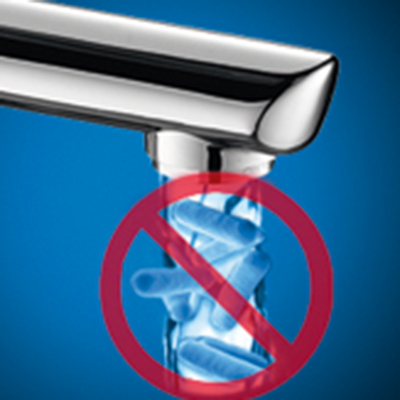

The risks associated with water
Water, an essential element for hygiene, can also be an important carrier for infection if its quality is not guaranteed. Controlling its quality has become a major and ongoing concern for those responsible for buildings open to the public such as hotels and tourist accommodation, campsites, swimming pools and prisons.
The Health and Safety Executive (HSE) recommend monitoring the bacteriological quality of water in all buildings where a risk has been identified (see below). This relates specifically to outlets that may contain legionella pneumophilia and that are likely to create aerosols (a spray of micro droplets in the air).
Public buildings should check the hot water production, storage and distribution systems. There are various different ways of doing this such as measuring the water temperature or sampling for Legionella in all hot water systems at risk. Moreover, even if monitoring for Legionella is undertaken infrequently, sampling is recommended to ensure that no bacteria are present in the hot water system, particularly prior to opening a new building. This allows the duty holder to have the test results prior to the public arriving at the premises.
If Legionella is discovered in a hotel, on a campsite or at a swimming pool, the duty holder must treat the problem. However, this can take time. Anti-bacterial terminal filters are the obvious solution to protect the customer’s health and to avoid the extreme solution of closing the building, allowing the duty holder time to correct the problem in the system.
The emergency solution to provide microbiologically controlled water
Microfiltration at the point-of-use is the most effective treatment to guarantee water free from microorganisms such as bacteria (Legionella), fungi, and algae, etc. Anti-bacterial filters provide total protection against waterborne infections. There are two types of membrane filtration for point-of-use filtration, flat or hollow fibre membranes. DELABIE has chosen the most recent technology for its range of BIOFIL anti-bacterial filters – hollow fibre membrane filtration.
Developed in the 1970s, this membrane technology is recognised as the most effective for water purification. It includes applications up to ultrafiltration (0.001 microns) in many sectors including domestic, medical and industrial.
Each BIOFIL filter has an integrated polyethylene hollow fibre membrane with a water filtration threshold of 0.1 micron absolute-rated. The hollow fibre membrane has multiple pores which vary in size from 0.01 – 0.1 micron. The water requiring treatment passes through the filter due to the pressure difference on either side of the membrane. Bacteria and any particles in suspension larger than 0.1 micron are retained permanently on the external surface of the membrane.
BIOFIL, the filter of choice
The technology adopted by DELABIE for its terminal filters allows a larger volume of water to be filtered compared to filters with flat membranes thanks to a larger filtration surface area (1,400cm² compared to approximately 500cm²). As a result, the storage capacity for bacteria and impurities is also much greater, slowing the clogging of filters and increasing their lifespan.
DELABIE offers a complete range of single-use water filters – BIOFIL cartridges and shower heads. In the BIOFIL range, the non-sterile, anti-bacterial filters (anti-Legionella filters in particular) are suitable for personal washing, hand washing and hydrotherapy in public buildings. They can be used for a period of up to 62 days after initial installation. The facilities manager is responsible for changing the filters regularly and checking that they are working correctly (guarding against premature clogging in poor water quality areas).
Unlike other filters, the BIOFIL filters are smaller due to the compact nature of the hollow fibres. They will fit on most of DELABIE’s basin mixers and taps. The brand also has the only filters that can be fitted to shower panels in commercial places. Push-fit connectors, which are supplied separately, enable BIOFIL filters to be fitted quickly to the point-of-use that requires securing without the need for any tools.
All BIOFIL filters are subject to numerous quality controls with optimal traceability to control the health risk fully. Sold in packs of 10, BIOFIL cartridge and shower head filters offer an emergency solution to bacterial problems sometimes encountered by the duty holders in public buildings.
MONITORING FOR LEGIONELLA
The Health and Safety Executive (HSE) guidance for the control of legionella bacteria in hot and cold water systems states that monitoring for Legionella should be carried where there is a doubt about the efficacy of the control regime or where the recommended temperatures, disinfectant concentrations or other precautions are not consistently achieved throughout the system.
In all buildings where the Health and Safety at Work Act (1974) applies, the frequency of testing should be determined by a risk assessment, the guidance suggests for example:
- Testing should be monthly when water is treated with biocides or distribution temperatures are reduced from HSE guidelines.
- Testing should be weekly where water treatment regime control levels are not being consistently achieved.
(Source: HSG274 part 2, 2014).


